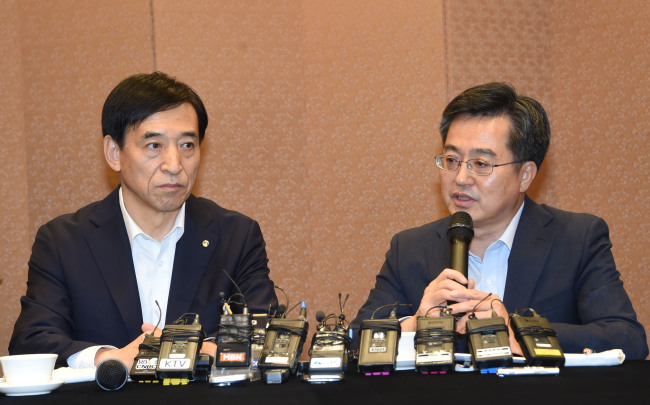South Korea’s finance minister and fiscal policy chief on Wednesday vowed to take stern measures to stabilize the financial markets if necessary, as response to the tensions caused by North Korea’s nuclear provocations.
Deputy Prime Minister for Economic Affairs and Finance Minister Kim Dong-yeon and Bank of Korea Governor Lee Ju-yeol attended a luncheon, seeking cooperation amid the challenging economic situations.
 |
Deputy Prime Minister for economic affairs and Finance Minister Kim Dong-yeon (right) meets with Bank of Korea Governor Lee Ju-yeol on Wednesday to discuss financial countermeasures to North Korea's military threats. (Ministry of Strategy and Finance) |
“(The government), together with the BOK, will keep a close watch on the market and shall take stern measures to stabilize the market, should there be such needs,” Kim said in a press conference, referring to the North Korean factor.
Governor Lee also said that the BOK will make aggressive efforts on its part and closely monitor the domestic and foreign financial markets.
“The geopolitical risks related to North Korea elevated the volatility and domestic and foreign financial markets last week,” he said.
“The situations seem to be settling down but there is a possibility that market instability may revive, depending on the development of North Korea’s nuclear risks.”
Tensions swept across the Korean Peninsula last week as North Korea and the United States traded threats after the United Nations tightened sanctions on Pyongyang for its two missile tests last month.
While North Korea claimed it had a plan to launch ballistic missiles at the US territory of Guam, US President Donald Trump said that his military is “locked and loaded” to deal with the North’s provocations and that the communist regime would face “fire and fury,” should its threats continue.
Reflecting such turbulence, the credit default swap premium for South Korean foreign exchange reached 70 basis points as of Monday, the highest level in 18 months, outrunning that of China, according to the data by the Korea Center for International Finance.
Kim and Lee, meanwhile, dismissed concerns that the financial measures on the issue may have come a step too late.
“(Ever since the North-US tensions escalated), the government and the BOK have been exchanging information on working levels and addressing key issues on a real-time basis,” said Kim.
The two top officials also shared opinions on the domestic economic situations in general, including the ongoing budget compilation, implementation plans for President Moon Jae-in’s state affairs tasks, and adjustment of the annual expenditure system.
“Considering the continuous recovery trend of the domestic economy, along with the current account surplus and the foreign exchange reserves, the market situations are favorable but we shall nevertheless provide against (possible challenges),” Lee said.
Touching on the key interest rate, Minister Kim reiterated his previous stance that the central bank holds exclusive rights over the issue.
“The key interest rate is a decision to be made independently by monetary authorities. It is inappropriate for any government official to mention the issue in details,” Kim said.
Recently, a hint of disapproval came from the presidential office as a high-profile Cheong Wa Dae official was reported as saying that the current rates are “considerably low.”
By Bae Hyun-jung (
tellme@heraldcorp.com)





![[Exclusive] Hyundai Mobis eyes closer ties with BYD](http://res.heraldm.com/phpwas/restmb_idxmake.php?idx=644&simg=/content/image/2024/11/25/20241125050044_0.jpg)
![[Herald Review] 'Gangnam B-Side' combines social realism with masterful suspense, performance](http://res.heraldm.com/phpwas/restmb_idxmake.php?idx=644&simg=/content/image/2024/11/25/20241125050072_0.jpg)

